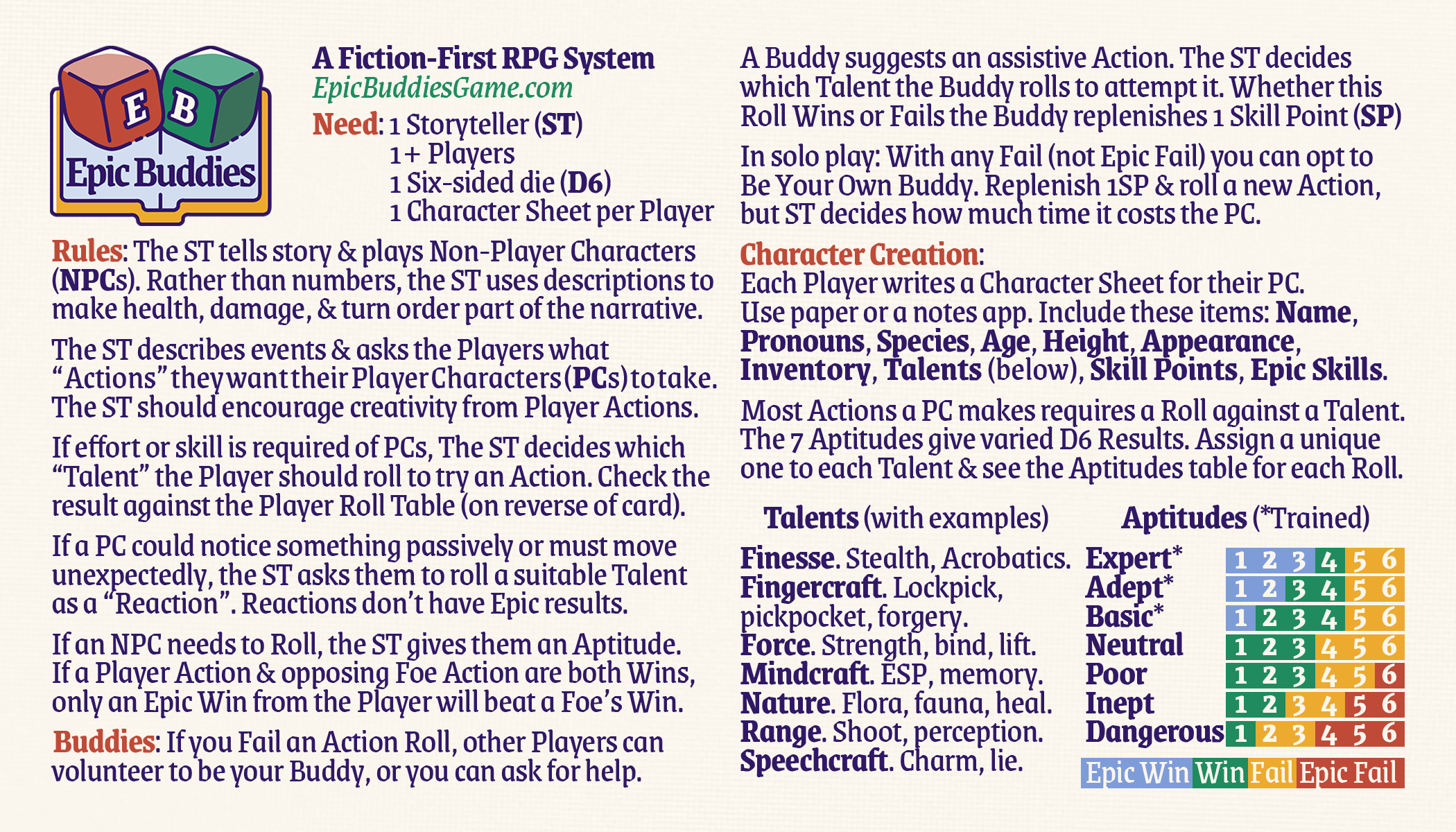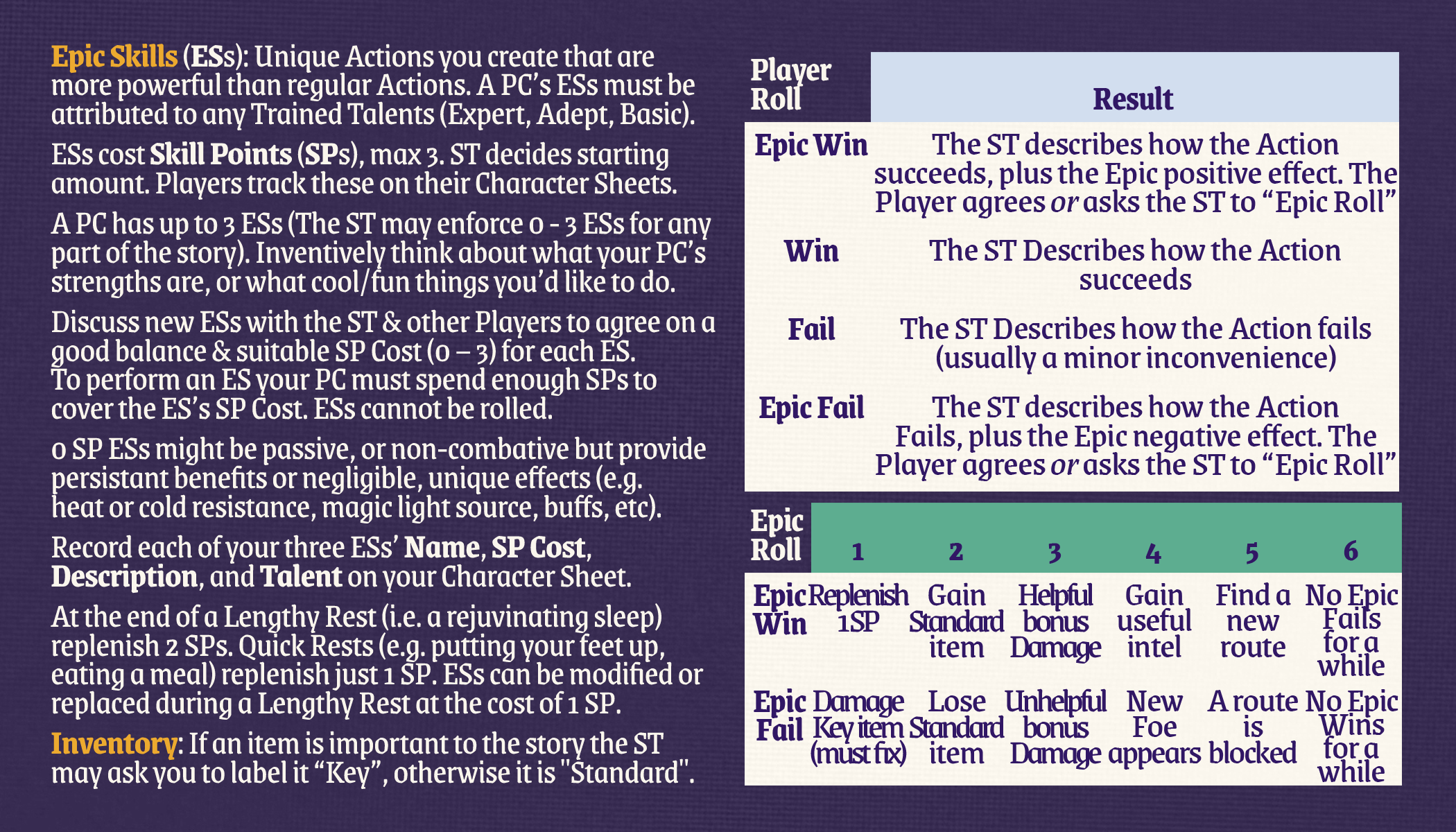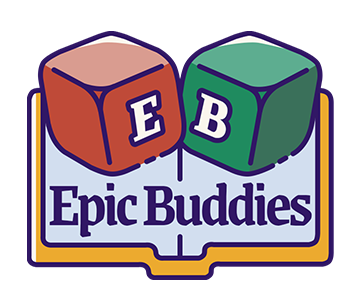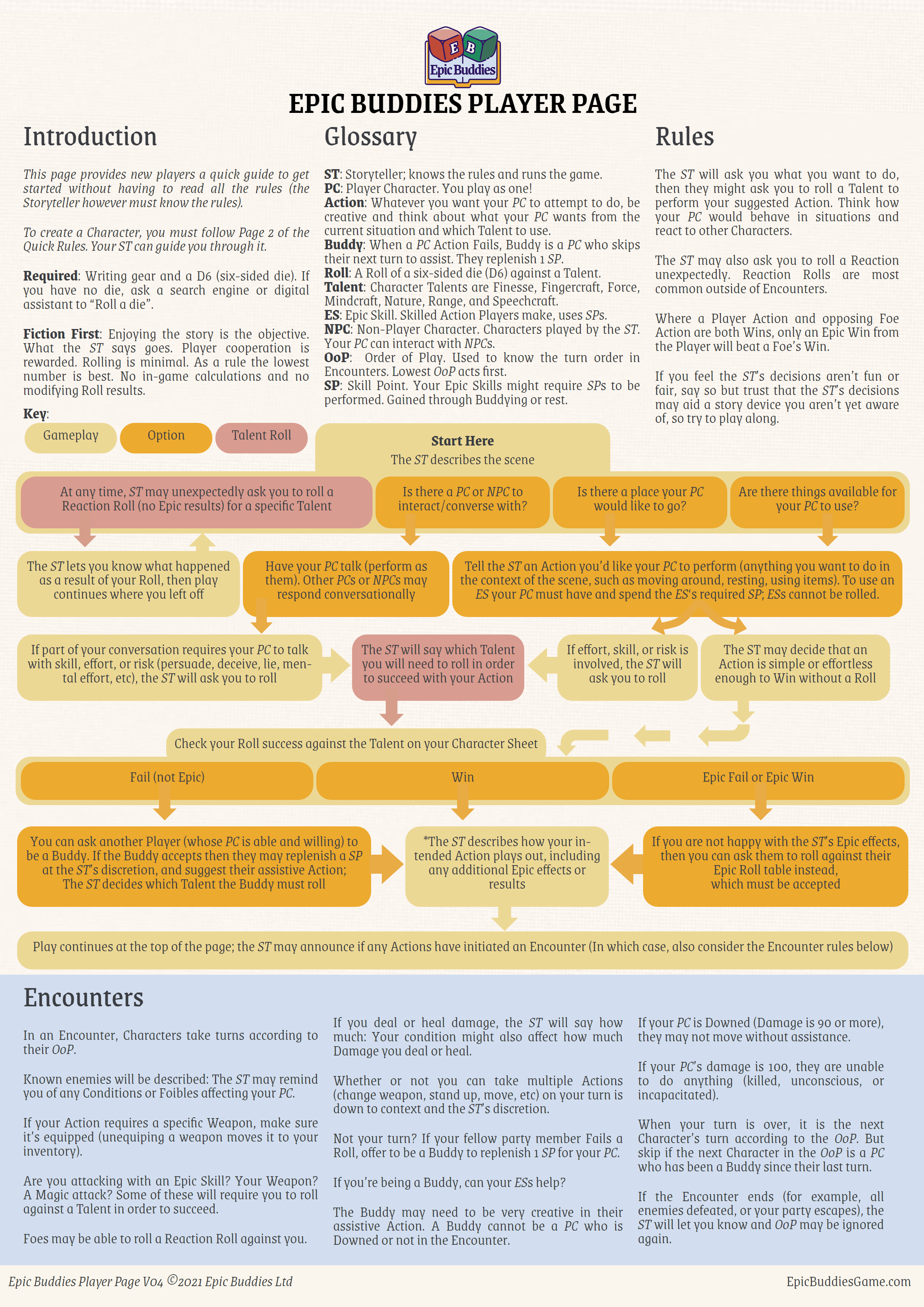Download Rules - Pay What You Want!
The two page Quick Rules can be printed on a single sheet of A4 back to back (duplex).
If you want to provide new players fewer rules, they can be given the Player Page instead of the Quick Rules.
Print out a copy of the Character Sheet for each player.
Click the “Download on itch.io” button above to pay what you want for the Quick Rules.
If it’s not working, you can visit our itch.io here to get the rules and make an optional donation to support the game’s development.
CARD RULES
First up are the smallest, quickest rules. If you want the simplest form of Epic Buddies in a portable package, these playing card sized rules are for you. Otherwise, open the Quick Rules below.


QUICK RULES
Use the buttons below to open the rules pages.
The rules consist of only two pages and it is important that the Storyteller (who runs the session) understands them, especially Page 1.
Page 2 can be used as a step-by-step guide to creating a character. Before your first session the Storyteller could read Page 2 to the Players as they fill their Character Sheets in.

Epic Buddies Quick Rules - Page 1
This game system is still in development, rules are subject to change.
Everything written here was created by and is owned by
Epic Buddies Ltd – EpicBuddiesGame.com
Players: 1 Storyteller (ST), 1+ Players.
Required: Writing gear and a D6 (six-sided die). If you have no die, ask a search engine or digital assistant to “Roll a die”.
Fiction First: Enjoying the story is the objective. What the ST says goes. Player cooperation is rewarded. Rolling is minimal. As a rule the lowest number is best. No in-game calculations and no modifying roll results.
Storyteller
The ST tells a story and plays Non-Player Characters (NPCs).
The ST describes events and asks the Players what “Actions” they want their Player Characters (PCs) to take. The ST should encourage creativity.
If PCs and/or NPCs need to take turns, this is an “Encounter”; Actions of the PCs and NPCs resolve in their “Order of Play” (page 2).
If effort or skill is required of PCs, the ST decides which Talent the Player should roll to make it happen. Check the result against the Player Roll Table.
The ST should add challenge for heightened drama, not to punish Players.
If a PC could notice something passively or must move unexpectedly, the ST asks them to roll a suitable Talent as a “Reaction”. Reactions don’t replace Actions during Encounters and don’t have Epic results.
The ST can tell whatever story they want. Make it up on the fly, adapt a favourite book, movie, or video game, or use a scenario from a different role playing game. Improvisation is key! Work collaboratively with your Players.
NPCs
An NPC is any Character played by the ST. They might be friend or Foe.
Typically, NPCs can’t Buddy and have no need for a Character Sheet, however these are at the ST’s discretion. Consider their Fancies and Foibles to create well-rounded Characters (see Page 2).
Assign an Order of Play speed (see Page 2) between 0 (fast) and 8 (slow).
Assign each NPC their own Aptitude (based on the “Talent Aptitudes” in the “Talents” section on Page 2). This is a general indicator of their skill. All NPC Actions and Reactions use their allocated Aptitude die (unless they have a full Character Sheet).
Assume the strongest, most capable NPCs roll “Trained Expert” (boss fights, faction leaders, etc), and the weakest (expendable minions, non-combative farmhands, small animals, etc) roll “Dangerous”.
NPC Actions may offer a chance for Reactions from other Characters at the ST’s discretion, to prevent, reduce, or alter the effects of that Action.
Damage dealt to and by NPCs can be checked against the Damage Table. Epic Wins deal additional Damage. Epic Fails skip a turn during Encounters.
Players
Enjoy the story! Roleplay your Character; imagine how they would behave in situations and react to other Characters.
The ST will ask you what you want to do, then they might ask you to roll a Talent to perform your suggested Action. Check the roll result against the Player Roll Table.
The ST may also ask you to roll a Reaction unexpectedly. Reaction Rolls are most common outside of Encounters.
Where a Player Action and opposing Foe Action are both Wins, only an Epic Win from the Player will beat a Foe’s Win.
If you feel the ST’s decisions aren’t fun or fair, say so but trust that the ST’s decisions may aid a story device you aren’t yet aware of, so try to play along.
Buddies
If you Fail an Action Roll, a Buddy can help. Other Players can volunteer to be your Buddy, or you can ask for help. The ST may prompt players to be a Buddy. A Buddy cannot help with Epic Fails or Reaction Roll Fails.
A Buddy suggests an assistive Action and the ST decides which Talent the Buddy rolls for that assistive Action.
In an Encounter: The Buddy Action is taken instead of their next Action and Buddy replenishes 1 SP. Otherwise: The SP replenishes at the ST’s discretion.
In solo play: With any Fail roll you can opt to Be Your Own Buddy.
Re-roll your attempted Action, replenish 1 SP, but skip your next turn.
Rolls
An Action or Reaction Roll requires the Player to roll a D6.
Rolls of 1 and 2 always result in a Win, 5 and 6 are always a Fail.
Depending on the “Talent Aptitude” (see Page 2), Actions may be Epic.
If the Player asks the ST to Epic Roll, they must accept the Roll result.
When Damage is dealt or healed, the ST may use the Damage Table.
Player
Roll
Epic Win
Win
Fail
Epic Fail
Result
The ST describes how the Action succeeds, plus the Epic positive effect. The Player agrees or asks the ST to “Epic Roll” instead
The ST Describes how the Action succeeds
The ST Describes how the Action fails (usually a minor inconvenience)
The ST describes how the Action Fails, plus the Epic negative effect. The Player agrees or asks the ST to “Epic Roll” instead
Epic
Roll
Epic Win
Epic Fail
1
Replenish 1 SP
Damage Key item (must fix)
2
Gain
Standard
item
Lose
Standard
item
3
Helpful bonus Damage
Unhelpful bonus Damage
4
Gain
useful
intel
New Foe appears
5
Find a
new route
A route is blocked
6
No Epic Fails for a while
No Epic Wins for a while
Damage
Approx. Amount
Weak
5
Light
10
Middling
20
Strong
30
Massive
40
Extreme
90
Epic Buddies Quick Rules V16 ©2023 Epic Buddies Ltd

Epic Buddies Quick Rules - Page 2
Character Creation
Ensure all items in bold on this page are written on your Character Sheet:
Character Name, Pronouns, Species, Age, Height, Appearance.
Create a Backstory and run it by your ST to make sure it fits with the story.
Note down your Character’s two Fancies (what motivates them) and two Foibles (quirks or flaws that affect their combat, decisions, or interactions).
Agree on a Party Name with your ST and other Players, and maybe include a picture of your character if you have printed your Character Sheet.
If allowed by the ST, a player may make more than 1 Character Sheet (transforming/multiple PCs, expanded Companion info etc).
Talents
The Talents are listed below alongside their speed rating and examples:
Finesse. (Fast) Balance, stealth, dodging, acrobatics.
Fingercraft. Lockpicking, pickpocketing, sign language, forgery.
Force. (Slow) Strength, bind, push & pull, lift.
Mindcraft. (Fast) ESP, paranormal, knowledge, strategy, memory, wits.
Nature. (Slow) Flora, fauna, elements, medicine & health.
Range. (Fast) Projectiles, perception, shout, gauge distance, teleport.
Speechcraft. (Slow) Charm, deceive, barter, translate, lull.
Talent “Aptitudes” listed from best to worst along with their result likelihood:
TE
Trained Expert
1 | 2 | 3 | 4 | 5 | 6 |
|---|
TA
Trained Adept
1 | 2 | 3 | 4 | 5 | 6 |
|---|
TB
Trained Basic
1 | 2 | 3 | 4 | 5 | 6 |
|---|
N
Neutral
1 | 2 | 3 | 4 | 5 | 6 |
|---|
P
Poor
1 | 2 | 3 | 4 | 5 | 6 |
|---|
I
Inept
1 | 2 | 3 | 4 | 5 | 6 |
|---|
D
Dangerous
1 | 2 | 3 | 4 | 5 | 6 |
|---|
Key:
Epic Win | Win | Fail | Epic Fail |
|---|
Write a unique Talent under each Aptitude (TE is best, D is worst). Talents are core to play so assign according to a Character’s strengths and weaknesses.
Encounters
Damage. Damage starts at 0 and can reach 100. At 90 a PC is downed and cannot move without assistance. At 100 a PC is incapacitated/killed. Suggested Damage amount dealt/healed on the Damage Table (Page 1).
Condition. Statuses altering a PC’s actions or causing them Damage over time e.g. compelled, terrified, bound, asleep, poisoned, downed. The ST will let a Player know as and when their PC is affected by something and should factor it into their decisions and the story.
Order of Play. A Character’s Order of Play (OoP) number is worked out at Character creation, not rolled at each Encounter. Your party will always resolve Encounters in the same order. NPCs and Foes will be slotted in by the ST, some may take more or fewer turns per round. Lowest OoP acts first.
Start at 4 when working out your OoP score. Every “Fast” Trained Talent will subtract “1” from your number, and every “Slow” Trained Talent will add “1”.
Ties are resolved first by who has a Fast Trained Expert Talent, then by who has Mindcraft trained to the higher Aptitude, and finally by the ST if still tied.
After calculating your OoP note which PC you Play After.
Magic. Either one of the crafts (Finger-, Mind-, Speech-) or None.
A PC’s magic is cast only this way, unless using an item imbued with magic.
Weapon. You get one slot; this is your equipped weapon or weapon set e.g. sword & shield, daggers, staff, pistols, axe, spellbook, bow & arrows.
The equipped weapon doesn’t use an inventory slot even out of combat. Replacing it unequips it. Any unequipped weapons take up an inventory slot.
Inventory
Your PC gets 12 slots and can free up space by discarding or selling items. Some things can be bundled e.g. food, med kits, ammo, cooking utensils.
Agree with the ST on a few items that your Character would begin with.
If an item is important to the story the ST may ask you to label it as “Key”, otherwise it is considered a Standard item.
Currency. Ask the ST. The ST’s world and your Character’s background will dictate the starting amount and denomination.
Companion. Your creature or automaton. They aren’t inventory, they don’t fight, but they can be a mount and/or can carry a single item for your PC.
Epic Skills
Epic Skills (ESs) are Actions you create that have a more powerful effect than regular Actions. A PC’s ESs must be attributed to any of their Trained Talents.
ESs cost Skill Points (SPs). The ST decides each PC’s starting amount. Max 3.
A PC has up to 3 ESs (The ST may enforce fewer or no ESs for any part of the story). Be inventive, think about what your PC’s strengths are, or what cool and fun things you’d like to do. Discuss new ESs with the ST and other Players to agree on a good balance and suitable SP Cost (0 – 3) for each ES.
0 SP ESs might be passive, or non-combative but provide persistant benefits or negligible, unique effects (e.g. fireproof, magic light source, buffs, etc).
Record each of your three ESs’ Name, SP Cost, Description, and Talent.
To perform an ES your PC must spend enough SPs to cover the ES’s SP Cost.
ESs cannot be rolled.
At the end of a Lengthy Rest (i.e. a rejuvinating sleep) replenish 2 SPs.
Quick Rests (e.g. putting your feet up, eating a meal) replenish just 1 SP.
ESs can be modified or replaced during a Lengthy Rest at the cost of 1 SP.
Epic Buddies Quick Rules V16 ©2023 Epic Buddies Ltd
Thank you for playing, Buddies!
Every Player Character needs a sheet. This Character Sheet in particular is optional, as a Player could just as easily use a blank sheet of paper and follow Quick Rules Page 2 to fill it in.

Epic Buddies - Character Sheet
Character
A4 printable PDF versions of the rules and this sheet (with editable fields) are available from epicbuddiesgame.itch.io
Player:
Party Name:
Character Name:
Pronouns:
Species:
Age:
Height:
Appearance:
Backstory:
Fancies:
(Motivations, Goals, Likes)
Foibles:
(Weaknesses, Flaws, Dislikes)
Character portrait and/or notes
Talents
Write a unique Talent under each Aptitude (TE is best, D is worst).
Epic Win | Win | Fail | Epic Fail |
|---|
TE
Trained
Expert
1 | 2 | 3 | 4 | 5 | 6 |
|---|
TA
Trained
Adept
1 | 2 | 3 | 4 | 5 | 6 |
|---|
TB
Trained
Basic
1 | 2 | 3 | 4 | 5 | 6 |
|---|
N
Neutral
1 | 2 | 3 | 4 | 5 | 6 |
|---|
P
Poor
1 | 2 | 3 | 4 | 5 | 6 |
|---|
I
Inept
1 | 2 | 3 | 4 | 5 | 6 |
|---|
D
Dangerous
1 | 2 | 3 | 4 | 5 | 6 |
|---|
Encounter Stats
Damage:
Condition:
Order of Play:
Play After:
Magic:
Weapon:
Inventory
Don’t forget to label Key items (Standard items do not need to be labelled).
1:
2:
3:
4:
5:
6:
7:
8:
9:
10:
11:
12:
Currency:
Companion:
Epic Skills
Skill Points:
Epic Skill 1
Name:
Talent:
SP Cost:
Description:
Epic Skill 2
Name:
Talent:
SP Cost:
Description:
Epic Skill 3
Name:
Talent:
SP Cost:
Description:
Epic Buddies Character Sheet V16 ©2023 Epic Buddies Ltd
EpicBuddiesGame.com
The Player Page is an optional quick start for new players. Rather than have players read the Quick Rules Pages, they can follow how gameplay works from this one sheet.

Epic Buddies Player Page
Introduction
This page provides new players a quick guide to get started without having to read all the rules (the Storyteller however must know the rules).
To create a Character, you must follow Page 2 of the Quick Rules. Your ST can guide you through it.
Required: Writing gear and a D6 (six-sided die). If you have no die, ask a search engine or digital assistant to “Roll a die”.
Fiction First: Enjoying the story is the objective. What the ST says goes. Player cooperation is rewarded. Rolling is minimal. As a rule the lowest number is best. No in-game calculations and no modifying Roll results.
Key:
Gameplay
Option
Talent Roll
Glossary
ST: Storyteller; knows the rules and runs the game.
PC: Player Character. You play as one!
Action: Whatever you want your PC to attempt to do, be creative and think about what your PC wants from the current situation and which Talent to use.
Buddy: When a PC Action Fails, Buddy is a PC who skips their next turn to assist. They replenish 1 SP.
Roll: A Roll of a six-sided die (D6) against a Talent.
Talent: Character Talents are Finesse, Fingercraft, Force, Mindcraft, Nature, Range, and Speechcraft.
ES: Epic Skill. Skilled Action Players make, uses SPs.
NPC: Non-Player Character. Characters played by the ST. Your PC can interact with NPCs.
OoP: Order of Play. Used to know the turn order in Encounters. Lowest OoP acts first.
SP: Skill Point. Your Epic Skills might require SPs to be performed. Gained through Buddying or rest.
Rules
The ST will ask you what you want to do, then they might ask you to roll a Talent to perform your suggested Action. Think how your PC would behave in situations and react to other Characters.
The ST may also ask you to roll a Reaction unexpectedly. Reaction Rolls are most common outside of Encounters.
Where a Player Action and opposing Foe Action are both Wins, only an Epic Win from the Player will beat a Foe’s Win.
If you feel the ST’s decisions aren’t fun or fair, say so but trust that the ST’s decisions may aid a story device you aren’t yet aware of, so try to play along.
Start Here
The ST describes the scene
At any time, ST may unexpectedly ask you to roll a
Reaction Roll (no Epic results) for a specific Talent
Is there a PC or NPC to interact/converse with?
Is there a place your PC would like to go?
Are there things available for your PC to use?
The ST lets you know what happened as a result of your Roll, then play continues where you left off
Have your PC talk (perform as them). Other PCs or NPCs may respond conversationally
Tell the ST an Action you’d like your PC to perform (anything you want to do in the context of the scene, such as moving around, resting, using items). To use an ES your PC must have and spend the ES‘s required SP; ESs cannot be rolled.
If part of your conversation requires your PC to talk with skill, effort, or risk (persuade, deceive, lie, mental effort, etc), the ST will ask you to roll
The ST will say which Talent you will need to roll in order to succeed with your Action
If effort, skill, or risk is involved, the ST will ask you to roll
The ST may decide that an Action is simple or effortless enough to Win without a Roll
Check your Roll success against the Talent on your Character Sheet
Fail (not Epic)
Win
Epic Fail or Epic Win
You can ask another Player (whose PC is able and willing) to be a Buddy. If the Buddy accepts then they may replenish a SP at the ST’s discretion, and suggest their assistive Action;
The ST decides which Talent the Buddy must roll
*The ST describes how your intended Action plays out, including any additional Epic effects or results
If you are not happy with the ST’s Epic effects, then you can ask them to roll against their Epic Roll table instead,
which must be accepted
Play continues at the top of the page; the ST may announce if any Actions have initiated an Encounter (In which case, also consider the Encounter rules below)
Encounters
In an Encounter, Characters take turns according to their OoP.
Known enemies will be described: The ST may remind you of any Conditions or Foibles affecting your PC.
If your Action requires a specific Weapon, make sure it’s equipped (unequiping a weapon moves it to your inventory).
Are you attacking with an Epic Skill? Your Weapon? A Magic attack? Some of these will require you to roll against a Talent in order to succeed.
Foes may be able to roll a Reaction Roll against you.
If you deal or heal damage, the ST will say how much: Your condition might also affect how much Damage you deal or heal.
Whether or not you can take multiple Actions (change weapon, stand up, move, etc) on your turn is down to context and the ST’s discretion.
Not your turn? If your fellow party member Fails a Roll, offer to be a Buddy to replenish 1 SP for your PC.
If you’re being a Buddy, can your ESs help?
The Buddy may need to be very creative in their assistive Action. A Buddy cannot be a PC who is Downed or not in the Encounter.
If your PC is Downed (Damage is 90 or more), they may not move without assistance.
If your PC’s damage is 100, they are unable to do anything (killed, unconscious, or incapacitated).
When your turn is over, it is the next Character’s turn according to the OoP. But skip if the next Character in the OoP is a PC who has been a Buddy since their last turn.
If the Encounter ends (for example, all enemies defeated, or your party escapes), the ST will let you know and OoP may be ignored again.
Epic Buddies Player Page V04 ©2023 Epic Buddies Ltd
EpicBuddiesGame.com

